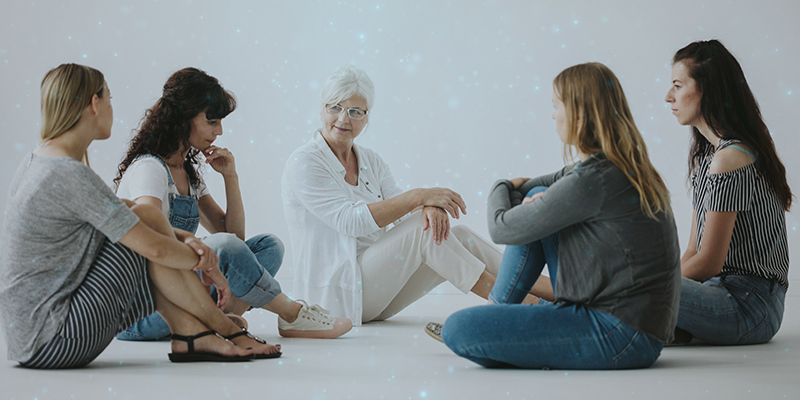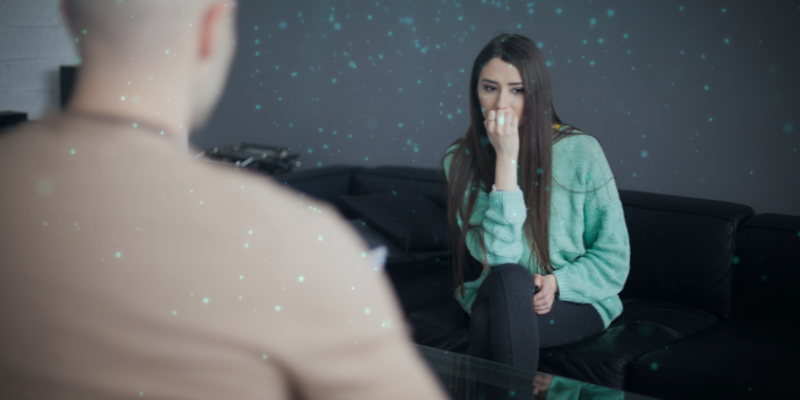
Did you know that anxiety and depression occur together 75% of the time? These conditions are so common in our society, yet they aren’t the same in everyone. Even so, traditional psychiatry continues to diagnose and treat people with anxiousness and depressive symptoms in a cookie-cutter fashion. Physicians are basically throwing medicated-tipped darts in the dark, guessing which antidepressants or anti-anxiety pills—or both—might work. This leads to far too many treatment failures and needless suffering.
Traditional psychiatry continues to diagnose and treat people with anxiety and depression in a cookie-cutter fashion. Click To TweetOnly one-third of people with depression respond fully to treatment with antidepressants, according to a 2014 study. And anti-anxiety pills, known as benzodiazepines, may be helpful in the short-term, but they can lead to long-term problems, including reduced brain activity, addiction, and memory loss.
Part of the reason for so many treatment failures is because conventional psychiatry doesn’t look at the organ it treats—the brain. The brain SPECT imaging work at Amen Clinics, which has the world’s largest database of functional brain scans related to behavior (over 160,000 scans from 155 countries), has identified 7 brain patterns associated with anxiety and depression. Each type needs its own treatment protocol.
This blog series will explore each type, including the common symptoms, brain SPECT findings, and effective interventions.
TYPE 3: MIXED ANXIETY/DEPRESSION
Type 3: Mixed Anxiety/Depression involves a combination of both Pure Anxiety and Pure Depression. People may be nervous, have panic attacks, feel uncomfortable in their own skin, and have a tendency to be too negative. At Amen Clinics, it’s also common for these people to self-medicate with toxic substances, such as alcohol or marijuana that calm the brain.
COMMON SYMPTOMS OF TYPE 3: MIXED ANXIETY/DEPRESSION
People with this type have a mix of anxiety symptoms and depression symptoms. One type may predominate at any point in time, but both symptom clusters are present on a regular basis.
Anxiety symptoms include:
- Frequent feelings of nervousness or anxiety
- Panic attacks
- Avoidance of people or places due to a fear of having anxiety or panic attacks
- Symptoms of heightened muscle tension (headaches, sore muscles, hand tremor)
- Periods of heart-pounding, nausea, or dizziness
- A tendency to predict the worst
- Multiple persistent fears or phobias (such as dying or doing something crazy)
- Conflict avoidance
- Excessive fear of being judged or scrutinized by others
- Being easily startled or a tendency to freeze in anxiety-provoking or intense situations
- Shyness, timidity, and getting easily embarrassed
- Biting fingernails or picking skin
Depression symptoms include:
- Persistent sad or “empty” mood
- Loss of interest or pleasure in activities that are usually fun, including sex
- Restlessness, irritability, or excessive crying
- Feelings of guilt, worthlessness, helplessness, hopelessness, pessimism
- Sleeping too much or too little, early-morning awakening
- Loss of appetite and/or weight loss, or overeating and weight gain
- Decreased energy fatigue, feeling “slowed down”
- Thoughts of death or suicide, or suicide attempts
- Difficulty concentrating, remembering, or making decisions
- Persistent physical symptoms that do not respond to treatment, such as headaches, digestive disorders, and chronic pain
- Persistent negativity or chronic low self-esteem
- Persistent feeling of dissatisfaction or boredom
TYPE 3: MIXED ANXIETY/DEPRESSION IN THE BRAIN
Brain imaging reveals that people experiencing the same symptoms may have very different processes occurring in the brain. On SPECT, this type shows excessive activity in two areas of the brain—the basal ganglia and the deep limbic system.
- Basal ganglia: This set of large structures toward the center of the brain surround the limbic system. They are involved with integrating feelings, thoughts, and movement, along with helping to shift and smooth motor behavior. Research suggests the basal ganglia are involved in forming habits. At Amen Clinics, we’ve noticed they are also involved with setting the body’s anxiety level. In addition, the basal ganglia help to modulate motivation and are involved with feelings of pleasure and ecstasy (which is why drugs like cocaine and methamphetamines work in this part of the brain).
- Deep limbic system: This system is one of the most interesting and critical parts of being human and is power-packed with functions, all of which are critical for human behavior and survival. The limbic system typically includes the thalamus (involved in relaying information), amygdala (fear center), hippocampus (memory center), hypothalamus (emotional center), and olfactory cortex (sense of smell).

(Healthy Active SPECT Scan)

(Anxiety Active SPECT Scan)
INTERVENTIONS FOR TYPE 3: MIXED ANXIETY/DEPRESSION
This type is best treated with a brain-body approach that can include personalized nutraceuticals, lifestyle changes, helpful forms of psychotherapy, and targeted medications (when necessary). A growing body of research, including a 2009 study in Psychiatry Research, shows that SPECT neuroimaging can predict who will respond to certain antidepressants, such as SSRIs (selective serotonin reuptake inhibitors). Knowing which patients are more likely to respond well to certain medications and which ones aren’t, improves outcomes.
In terms of natural solutions, try a combination of therapies for anxiety and depression. For treatment to be effective, any toxic substances, such as mood-altering drugs or alcohol, must be stopped.
Depression, anxiety, panic attacks, and other mental health issues can’t wait. During these uncertain times, your mental well-being is more important than ever and waiting until life gets back to “normal” is likely to make your symptoms worsen over time.
At Amen Clinics, we’re here for you. We offer in-clinic brain scanning and appointments, as well as mental telehealth, remote clinical evaluations, and video therapy for adults, children, and couples. Find out more by speaking to a specialist today at 888-288-9834 or visit our contact page here.





Have had very, very bad insomnia for 25 years. Tried many sleep meds which either had the opposite effect, didn’t work or gave me horrific headaches. Been taking benzodiazepines for years. Have also taken all supplements recommended for insomnia. Help!!!! Any thoughts?
Comment by Sue Trzcinski — December 11, 2020 @ 3:20 AM
Hi,
When are you coming to Ireland. You have to be on deaths door to get anywhere near a brain scan here.
All the best,
Lisa
Comment by Lisa Conere — December 11, 2020 @ 4:26 AM
Thank you so much. My sister who died in 2019 of cancer admitted to having depression. But seeing this list she also had anxiety. Seeing everything in black and white is so helpful for me and my memories. Because besides the good memories there are ones that aren’t so good. Thank you so much for your articles!! You are a blessing!!!
Comment by lisa — December 11, 2020 @ 6:34 AM
Can this be helped by behavial change and controlling thoughts?
Comment by Gloria Coy — December 11, 2020 @ 7:03 AM
In 2013 I had a full evaluation at Amen Clinic in Atlanta. Diagnosis: GAD, temporal , anterior cingulate and limbic lobe dysfunction. Supplements Sam e 400, Nuro Link 3 capsules X 2 daily, Brain and Memory Power Boost 2 caps X 2 daily. In addition 2400 mg Fish Oil, multiple vitamin and a whole host of additional supplements and vitamins. Still experiencing sexual performance anxiety. Recommendations?
Comment by C. Courtney Trotter — December 11, 2020 @ 8:27 AM
How much are your services and do you accept any kind of insurance?
Comment by Melissa Cook — December 11, 2020 @ 10:18 AM
It seems like Annie Hopper’s Retrain Your Brain program would benefit people with type 3. Let’s not forget all the medical diagnoses that can cause anxiety. And, the mere fact of not feeling safe during frequent medical problems and chronic medical problems can and will cause depression in many.
Comment by Cari Johnson — December 11, 2020 @ 2:56 PM
I’ve been experiencing many of these symptoms but attributed them to these covid times and thinking once it’s all over I’ll be fine. But what if it doesn’t go away?
Comment by Diana — December 12, 2020 @ 3:38 AM
PLEASE PLEASE OPEN UP AN OFFICE IN NASSAU COUNTY NY……I DO NOT WANT TO TRAVEL INTO NYC….
Comment by Diane Lindenberger — December 12, 2020 @ 2:54 PM
I do not have a website of my own. I am interested in looking into MIXED ANXIETY/DEPRESSION in my brain and eliminating both Anxiety and Depression which I feel I have both. Having seen all the above items, I am even more interested in moving in the direction of: A) Not being depressed as often as I am
and B) eliminating the anxiety which is with me constantly, & causes me conflict with my spouse and family.
I look forward to hearing back from you and to determine if and when I want to get myself involved with Dr. Amen’s clinics etc.
Sincerely
Marvin Negrin
Comment by Marvin Negrin — December 12, 2020 @ 5:14 PM
I ❤️ Dr Amen and his work l, I totally agree our psychiatry system is so broken. If they would stop diagnosing people from a book and start understanding the true reason people are depressed there would be a lot less depressed people in the world. The scans are interesting 🤔 I had every single one of the symptoms in all 3 levels except I was not addicted to drugs or alcohol just sleep. I suffered from clinical depression and suicidal thoughts for 4 years before I learned what depression really was and the techniques to heal it. I’ve been depression free for 24 years! I wish you could have scanned my brain when I was suffering and after I healed it! I would love to see that study!!!
Comment by Marisela Abasta — December 14, 2020 @ 8:28 PM
Hello Melissa, thank you for reaching out. Amen Clinics is an out-of-network provider and we do not bill insurance. We do provide a superbill containing applicable diagnosis and billing codes, which can be submitted to insurance companies for possible reimbursement. Our doctors and therapists are not affiliated with any insurance plans or networks. Please check with your insurance provider for any mental health benefits. For additional information regarding your pricing, insurance, and financing options, please contact our Care Coordinators: https://amenclinics.com/schedule-visit/.
Comment by Amen Clinics — December 21, 2020 @ 7:30 PM
Hello, and thank you for reaching out. For a consultation with one of our specialists, please reach out to our Care Coordinators: https://amenclinics.com/schedule-visit/.
Comment by Amen Clinics — December 21, 2020 @ 7:30 PM
Hello Sue, thank you for reaching out. For a consultation with one of our specialists, please reach out to our Care Coordinators: https://amenclinics.com/schedule-visit/.
Comment by Amen Clinics — December 21, 2020 @ 7:31 PM